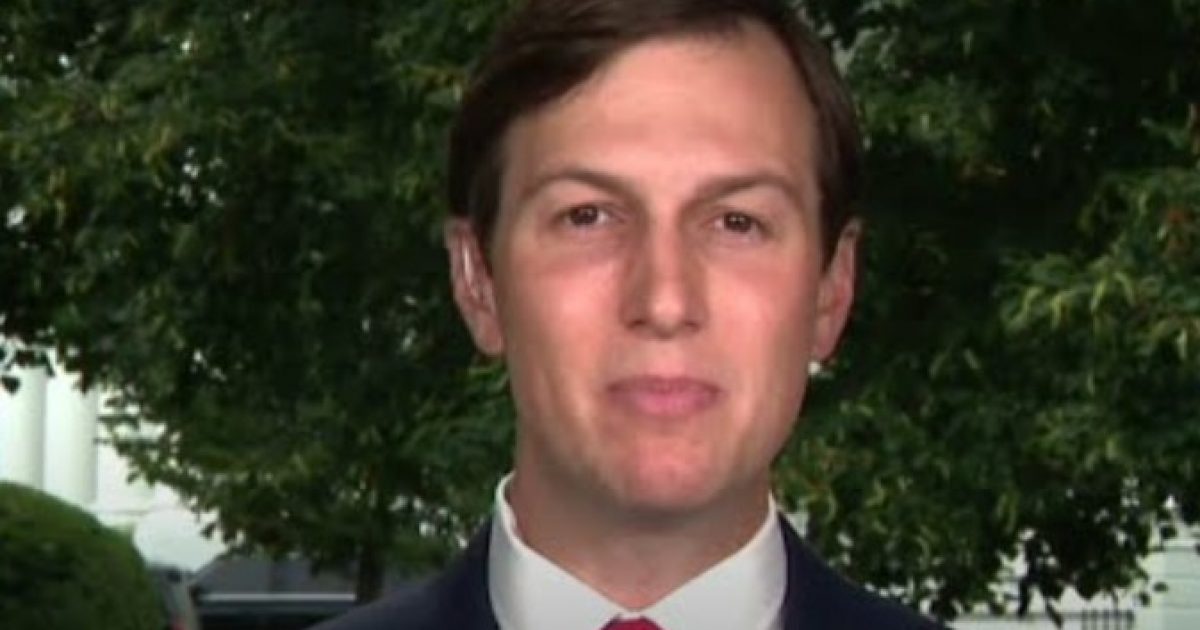Jared Kushner has finally broken his silence.
Kushner’s first public comments in months were featured in an op-ed for the Wall Street Journal that talked about peace in the Middle East.
Alongside Trump, Kushner was able to help broker multiple peace deals between Israel and Arab nations.
Kushner’s article for the WSJ was titled “Opportunity Beckons in the Mideast” and it argued that the Biden administration should build on Trump’s success in the Middle East instead of tearing down his accomplishments.
Jared also praised Trump in the article for “Eliminating the ISIS caliphate and bringing about six peace agreements—between Israel and the United Arab Emirates, Bahrain, Sudan, Morocco, and Kosovo, plus uniting the Gulf Cooperation Council”.
MUST READ by Jared Kushner:
Opportunity Beckons in the Mideast – WSJ https://t.co/uKTblXxJBY
— Boris Epshteyn (@BorisEP) March 14, 2021
In the opening paragraph of his op-ed, Kushner stated that over 130,000 Israelis have visited Dubai since President Trump orchestrated the Abraham Accords.
https://twitter.com/AnnieLinskey/status/1371433093341515776
The Epoch Times covered Kushner’s latest op-ed and shared these details:
Former senior White House adviser Jared Kushner has made his first public remarks since departing the White House earlier this year, penning an op-ed about the opportunity for peace in the Middle East.
The opinion article titled “Opportunity Beckons in the Mideast” published in The Wall Street Journal on Sunday, Kushner argues that the Biden administration would be mistaken not to build on the successes of the Trump administration in the region.
“Eliminating the ISIS caliphate and bringing about six peace agreements—between Israel and the United Arab Emirates, Bahrain, Sudan, Morocco, and Kosovo, plus uniting the Gulf Cooperation Council—has changed the paradigm,” Kushner wrote.
Kushner was one of four Trump-administration officials nominated for the Nobel Peace Prize in February for their roles in negotiating four normalization deals between Israel and Arab nations.
Kushner, who is the husband of Ivanka Trump, the daughter of former President Donald Trump, highlighted the Trump administration’s 2017 state visit to Saudi Arabia. In a speech in Riyadh during that trip, Trump rallied the Arab world against what he argued was a common adversary, radical Islamic extremism and the Iranian regime, the ideology’s biggest sponsor.
Some of the insight Jared Kushner brought to his WSJ op-ed:
"Every time Prime Minister Benjamin Netanyahu tweets something positive in Arabic about an Arab leader, it reinforces that Israel is rooting for the success of the Arab world."https://t.co/vhFtaBnyWg
— Jake Lahut (@JakeLahut) March 15, 2021
Here’s an excerpt from Kushner’s op-ed with the Wall Street Journal:
The geopolitical earthquake that began with the Abraham Accords hasn’t ended. More than 130,000 Israelis have visited Dubai since President Trump hosted the peace deal’s signing this past September, and air travel opened up for the first time in August. New, friendly relations are flowering—wait until direct flights get going between Israel and Morocco. We are witnessing the last vestiges of what has been known as the Arab-Israeli conflict.
The conflict’s roots stretch back to the years after World War II, when Arab leaders refused to accept the creation of the state of Israel and spent 70 years vilifying it and using it to divert attention from domestic shortcomings. But as more Muslims visit Israel through Dubai, images are populating on social media of Jews and Muslims proudly standing together. More important, Muslims are posting pictures of peaceful visits to the Al Aqsa Mosque in Jerusalem, blowing a hole in the propaganda that the holy site is under attack and Israelis prevent Muslims from praying there. Every time Prime Minister Benjamin Netanyahu tweets something positive in Arabic about an Arab leader, it reinforces that Israel is rooting for the success of the Arab world.
One of the reasons the Arab-Israeli conflict persisted for so long was the myth that it could be solved only after Israel and the Palestinians resolved their differences. That was never true. The Abraham Accords exposed the conflict as nothing more than a real-estate dispute between Israelis and Palestinians that need not hold up Israel’s relations with the broader Arab world. It will ultimately be resolved when both sides agree on an arbitrary boundary line.
The Biden administration is making China a priority in its foreign policy, and rightly so—one of Mr. Trump’s greatest legacies will be changing the world’s view of China’s behavior. But it would be a mistake not to build on the progress in the Middle East. Eliminating the ISIS caliphate and bringing about six peace agreements—between Israel and the United Arab Emirates, Bahrain, Sudan, Morocco and Kosovo, plus uniting the Gulf Cooperation Council—has changed the paradigm.



Join the conversation!
Please share your thoughts about this article below. We value your opinions, and would love to see you add to the discussion!